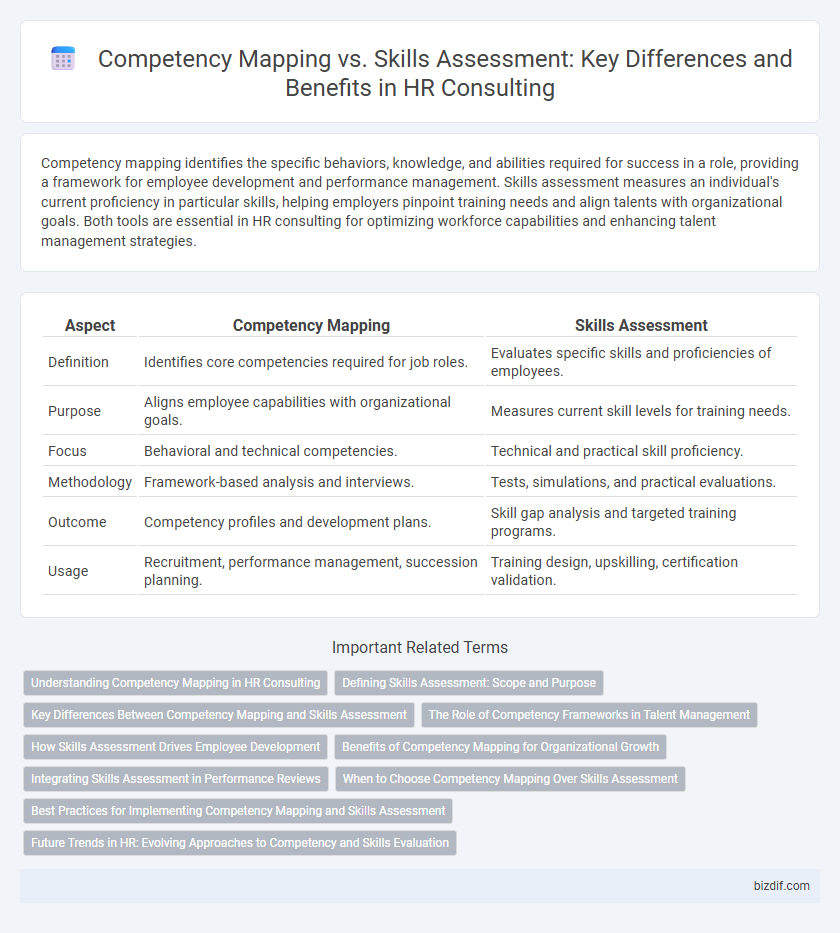Competency mapping identifies the specific behaviors, knowledge, and abilities required for success in a role, providing a framework for employee development and performance management. Skills assessment measures an individual's current proficiency in particular skills, helping employers pinpoint training needs and align talents with organizational goals. Both tools are essential in HR consulting for optimizing workforce capabilities and enhancing talent management strategies.
Table of Comparison
| Aspect | Competency Mapping | Skills Assessment |
|---|---|---|
| Definition | Identifies core competencies required for job roles. | Evaluates specific skills and proficiencies of employees. |
| Purpose | Aligns employee capabilities with organizational goals. | Measures current skill levels for training needs. |
| Focus | Behavioral and technical competencies. | Technical and practical skill proficiency. |
| Methodology | Framework-based analysis and interviews. | Tests, simulations, and practical evaluations. |
| Outcome | Competency profiles and development plans. | Skill gap analysis and targeted training programs. |
| Usage | Recruitment, performance management, succession planning. | Training design, upskilling, certification validation. |
Understanding Competency Mapping in HR Consulting
Competency mapping in HR consulting involves identifying the specific knowledge, skills, behaviors, and attributes required for a particular role to enhance organizational performance and employee development. It provides a structured framework to align individual capabilities with business goals more effectively than traditional skills assessment, which primarily measures technical abilities. This strategic approach supports talent acquisition, training, and succession planning by ensuring that competencies align with current and future organizational needs.
Defining Skills Assessment: Scope and Purpose
Skills assessment involves systematically evaluating an individual's technical abilities and job-related competencies to determine proficiency and identify gaps. It serves the purpose of aligning workforce capabilities with organizational goals by providing objective data for recruitment, training, and performance management. This approach focuses on measurable skills that directly impact job performance and productivity within specific roles.
Key Differences Between Competency Mapping and Skills Assessment
Competency mapping identifies the behaviors, knowledge, and abilities required for specific job roles, while skills assessment measures an employee's current proficiency in particular skills. Competency mapping provides a framework for talent development and aligns employee capabilities with organizational goals, whereas skills assessment offers a snapshot of skill levels for targeted training initiatives. These differences highlight competency mapping's strategic focus compared to the operational nature of skills assessment in HR consulting.
The Role of Competency Frameworks in Talent Management
Competency frameworks define specific behaviors, knowledge, and abilities essential for job roles, serving as the foundation for effective competency mapping in talent management. Competency mapping aligns employee capabilities with organizational goals, enabling precise identification of skill gaps and targeted development plans. In contrast, skills assessment measures individual technical proficiencies, but without an integrated competency framework, it may lack strategic context for long-term talent development and succession planning.
How Skills Assessment Drives Employee Development
Skills assessment plays a crucial role in driving employee development by accurately identifying individual strengths and skill gaps, enabling targeted training programs. This process facilitates personalized learning paths that align with organizational goals and enhance overall workforce competency. By continuously evaluating skills, companies can optimize talent management and boost employee performance effectively.
Benefits of Competency Mapping for Organizational Growth
Competency mapping identifies the specific skills, behaviors, and attributes required for optimal job performance, enabling organizations to align employee capabilities with strategic goals. This targeted approach enhances talent development, improves role clarity, and drives productivity by closing skill gaps more effectively than traditional skills assessment. By fostering a culture of continuous learning and performance improvement, competency mapping supports sustained organizational growth and competitive advantage.
Integrating Skills Assessment in Performance Reviews
Integrating skills assessment in performance reviews enhances competency mapping by providing precise data on employee abilities, enabling targeted development plans. This approach facilitates objective evaluation through measurable skill benchmarks aligned with organizational goals. Combining these methods drives improved talent management and strategic workforce planning in HR consulting.
When to Choose Competency Mapping Over Skills Assessment
Choose competency mapping over skills assessment when organizations aim to align employee capabilities with broader business goals and cultural fit, ensuring a strategic approach to talent development. Competency mapping is essential for identifying the specific behaviors, knowledge, and attributes required for job roles, supporting leadership development and succession planning more effectively than skills assessment alone. It proves invaluable during organizational transformation or restructuring, where understanding core competencies drives long-term performance and competitive advantage.
Best Practices for Implementing Competency Mapping and Skills Assessment
Effective competency mapping aligns job roles with organizational goals by identifying critical behaviors and traits, enhancing talent development and succession planning. Skills assessment provides quantifiable data on employee capabilities, enabling targeted training and performance improvement. Integrating both practices with clear frameworks, regular updates, and stakeholder collaboration ensures accurate evaluation and optimized talent management.
Future Trends in HR: Evolving Approaches to Competency and Skills Evaluation
Future trends in HR emphasize integrating advanced AI and machine learning to enhance competency mapping and skills assessment accuracy. Competency mapping evolves to predict potential and cultural fit, while skills assessments increasingly utilize real-time data analytics for personalized employee development. This shift drives strategic workforce planning and accelerates talent transformation in dynamic business environments.
Competency Mapping vs Skills Assessment Infographic

 bizdif.com
bizdif.com